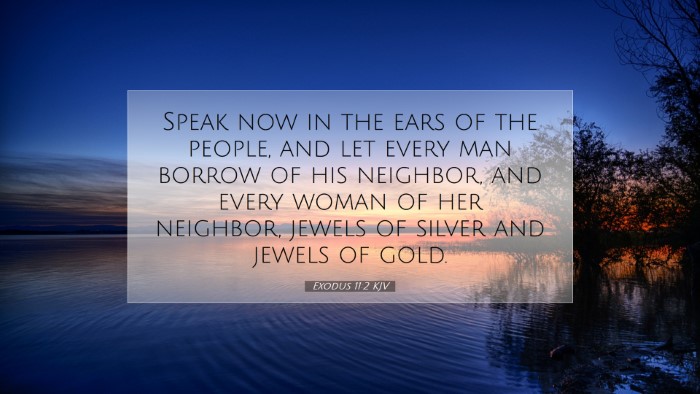Commentary on Exodus 11:2
Exodus 11:2 presents a pivotal moment in the narrative of the Exodus, where God prepares to enact the tenth plague upon Egypt, which signifies the impending liberation of the Israelites from slavery. The verse reads:
"Speak now in the ears of the people, and let every man ask of his neighbor, and every woman of her neighbor, jewels of silver and jewels of gold." (Exodus 11:2, ESV)
Contextual Overview
This passage occurs within the context of the final plagues that God brings upon Egypt to compel Pharaoh to release the Israelites. Previous plagues have demonstrated God's supremacy and judgment against the Egyptian gods and the stubbornness of Pharaoh's heart. This commentary explores the implications of the verse as it pertains to God's provision for His people and the symbolic significance of the jewels.
God's Command to the People
- Mentioned in public domain commentaries:
- Matthew Henry points out that this divine command indicates a foreseeing providence where the Israelites are instructed to ask their Egyptian neighbors for their possessions. This act is intended to signify both reclamation and divine favor.
- Albert Barnes highlights that this command showcases God’s grace, as it provides the Israelites with material wealth for their journey out of slavery, fulfilling God's promise to Abraham that His people would not leave empty-handed.
- Adam Clarke elaborates on the significance of the phrase “jewels of silver and jewels of gold,” indicating these items represent wealth that would be used for worship in the tabernacle, affirming God’s plan for His people.
Theological Insights
This command has significant theological implications that speak to God’s redemptive purposes:
- Provision: The request for jewels illustrates God's provision for the needs of His people. As they are set free from their bondage, they receive compensation for their years of harsh labor.
- Judgment: The act of asking the Egyptians for their valuables reflects a coming judgment. The wealth is essentially taken from those who kept the Israelites in bondage, symbolizing God's justice.
- Covenant Faithfulness: This event fulfills God's covenant promise to Abram in Genesis 15, where it was foretold that his descendants would leave with great possessions. This aspect underscores God’s faithfulness and sovereignty.
Implications for Liberation Theology
For contemporary listeners, especially in contexts of social justice and liberation theology, Exodus 11:2 serves as a potent reminder of God's aversion to oppression and His desire to see those who suffer liberated:
- Divine Concern for Justice: The passage reveals God’s concern for the oppressed, as He empowers the Israelites to seek restitution.
- Empowerment: The act of asking for valuables represents a shift in power. No longer are the Israelites passive victims; they are agents of God's deliverance.
- Community Involvement: The command is directed at the entire community, emphasizing collective action in the pursuit of justice and liberation.
Practical Applications
For pastors, theologians, and students of the Bible, several applications arise from this verse:
- Teaching Trust in God's Provision: The narrative provides a basis to teach congregations about trusting in God’s providences even amidst dire circumstances.
- Empowerment in Mission: Similar to the Israelites, believers are called to act in faith and seek the blessings of God’s kingdom through engagement with the world around them.
- Understanding Social Justice: This commentary encourages exploration of themes of justice and restitution, which can inspire ministries focused on aiding the oppressed.
Conclusion
Exodus 11:2 serves as a meaningful reflection on God’s active role in salvation history, showcasing His promise to provide for His people, affirming justice, and promoting empowerment through collective action. By integrating insights from esteemed commentators, we gain a multi-faceted understanding of this critical moment in Israel’s journey, serving as a theological foundation for applications in our own contexts as ministers, scholars, and students of the Word.


